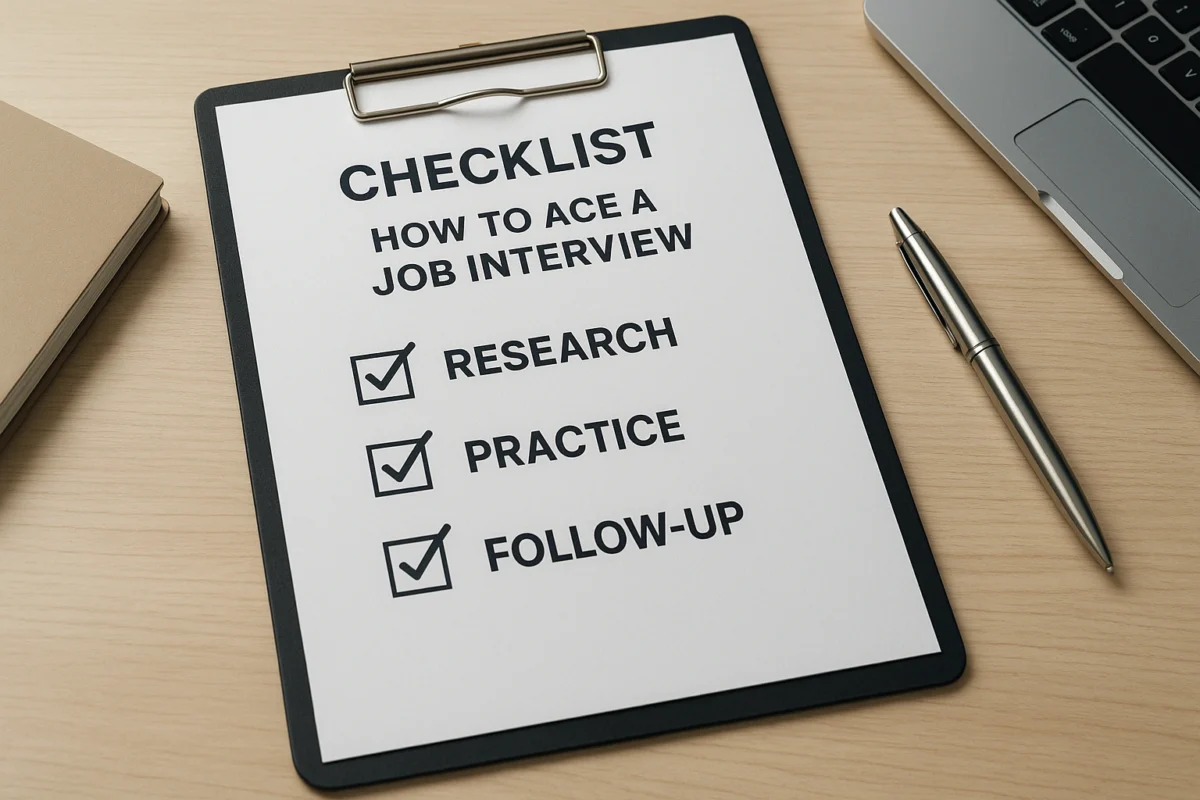- The Difference Between a Good Candidate and the Hired Candidate? Preparation.
- What is a Strategic Approach to Interviewing?
- Why a Strategic Approach is Your Secret Weapon
- The Pre-Interview Checklist: Your Foundation for Success
- Answering Common Interview Questions
- Common Interview Mistakes to Avoid
- Expert Tips to Make a Lasting Impression
- Frequently Asked Questions
- You’re More Prepared Than You Think
The Difference Between a Good Candidate and the Hired Candidate? Preparation.
You’ve polished your resume, written a compelling cover letter, and landed the interview for a job you really want. The most nerve-wracking part is ahead, but your interview toolkit will guide you through. The interview is where your skills shine, and using your interview toolkit helps manage the pressure effectively. One wrong answer can feel disastrous, yet with an interview toolkit by your side, you can approach each question with focus. By relying on your interview toolkit, you stay calm and transform anxiety into confident performance.
This guide is designed to replace fear with unshakable confidence, using your interview toolkit at every step. We’re going beyond generic advice to provide a complete interview toolkit that helps you ace your interview. You’ll explore an interview toolkit full of preparation techniques, frameworks for answering tough questions, and a collection of sample interview questions. With this interview toolkit in hand, you can walk into any room ready to perform at your best.
What is a Strategic Approach to Interviewing?
A strategic approach to interviewing means treating the interview not as a passive Q&A session, but as a proactive opportunity to market yourself effectively. It’s about understanding the employer’s needs and systematically demonstrating how your skills and experiences are the perfect solution. It involves deep research, crafting a compelling narrative, and preparing for any question that comes your way.
In today’s competitive job market, winging it is not an option. According to data from Glassdoor, the average corporate job opening attracts 250 resumes. This means that by the time you get to the interview, you are competing against a small pool of highly qualified candidates. A strategic, well-prepared approach is what separates the final contenders from the one who gets the offer.

Why a Strategic Approach is Your Secret Weapon
Investing time in preparation pays massive dividends.
It Builds Unshakable Confidence
Confidence isn’t something you’re born with; it’s something you build through preparation. When you’ve done your homework and practiced your stories, you can handle any question thrown at you with poise and clarity, turning anxiety into focused energy.
It Allows You to Control the Narrative
Without a plan, it’s easy for an interview to go off-track. A strategic approach allows you to consistently steer the conversation back to your key strengths and accomplishments, ensuring you communicate your most important selling points, regardless of the questions asked.
It Demonstrates Genuine Interest and Professionalism
A well-prepared candidate is an impressive candidate. Your in-depth knowledge of the company and thoughtful questions show that you are not just looking for *any* job, but that you are specifically interested in *this* job. For more career insights, resources like InfoinAja can provide a wealth of information.
The Pre-Interview Checklist: Your Foundation for Success
Winning the interview starts days before you walk in the door.
- Deconstruct the Job Description: Print out the job description and highlight the key skills and responsibilities. This is your cheat sheet. Your goal is to prove you have these exact qualifications.
- Become a Company Expert: Read the company’s “About Us” page, recent press releases, and social media feeds. Understand their mission, their competitors, and their recent successes.
- Prepare Your STAR Stories: Brainstorm 5-7 of your proudest accomplishments that align with the job description. Structure each one as a story using the STAR method (Situation, Task, Action, Result).
- Plan Your Outfit: Decide what you’re going to wear ahead of time. Ensure it’s clean, ironed, and appropriate for the company’s culture. This eliminates a major source of day-of stress.

Answering Common Interview Questions
Here’s how to tackle some of the most common (and tricky) questions.
| Question | What They’re Really Asking | Strategy |
|---|---|---|
| “Tell me about yourself.” | “Give me your 90-second elevator pitch.” | Use the Present-Past-Future formula. Connect your experience directly to the role. |
| “Why do you want to work here?” | “Have you done your research?” | Mention specific things about the company’s mission, values, or recent projects that excite you. |
| “What is your greatest weakness?” | “Are you self-aware and coachable?” | Choose a real, minor weakness and explain the concrete steps you’re taking to improve. |
| “Where do you see yourself in 5 years?” | “Are you ambitious and do your goals align with ours?” | Show that you see this role as a key step in your long-term growth and that you hope to take on more responsibility within the company. |
Common Interview Mistakes to Avoid
Don’t let these simple errors undermine your strong preparation.
- Not Having Questions for Them: When they ask “Do you have any questions for us?” the only wrong answer is “No.” It signals a lack of interest.
- Appearing Unenthusiastic: Your energy and enthusiasm matter. Sit up, lean in slightly, and let your passion for the role and company shine through.
- Giving One-Word Answers: Elaborate on your answers, providing context and examples. Turn every question into an opportunity to tell a story about your accomplishments.
- Not Knowing Your Resume: Be prepared to speak in detail about every single point on your resume. Any hesitation can look like you’ve exaggerated your experience.
Expert Tips to Make a Lasting Impression
“At the end of the interview, don’t just ask questions—reiterate your value. Summarize the key needs you’ve heard during the conversation and briefly restate how your top 2-3 skills are the perfect solution. It’s your closing argument, and it leaves a powerful final impression.”
— Hannah Chen, Executive Recruiter
- Mirror the Interviewer’s Language: Subtly use some of the same keywords and phrases your interviewer uses. This builds rapport and shows you’re an active listener.
- Send a Personalized Thank-You Note: In your follow-up email, reference a specific, interesting point from your conversation. This shows you were engaged and helps you stand out.
- Prepare for the “Off-the-Cuff” Moments: Be prepared for the small talk at the beginning and end of the interview. Have a brief, positive answer ready for “How was your weekend?” or “Did you find the place okay?”
Frequently Asked Questions
Q: What is the best way to answer ‘Tell me about yourself’?
A: Use the ‘Present-Past-Future’ formula. Start with your current role (Present), briefly mention past experiences that are relevant to the job (Past), and finish by explaining why you’re excited about this specific opportunity and what you hope to achieve (Future). Keep it concise, around 60-90 seconds.
Q: How many questions should I ask the interviewer?
A: Aim to have at least 3-5 thoughtful questions prepared. You may not ask all of them, but it shows you are engaged and have done your research. Ask questions about the team culture, the challenges of the role, and what success looks like in the first 90 days.
Q: What is the biggest mistake to avoid in a job interview?
A: One of the biggest mistakes is failing to research the company. Not understanding what the company does, its values, or its recent achievements shows a lack of genuine interest. Always spend time on the company’s website and recent news before your interview.
You’re More Prepared Than You Think
The job interview is your moment to shine, and a well-prepared interview toolkit ensures you make the most of it. By using your interview toolkit strategically, you replace anxiety with confidence. A strong interview toolkit turns uncertainty into a clear plan, helping you showcase your skills. Rely on your interview toolkit throughout the process to stay focused and give yourself the best chance to succeed.
Use your interview toolkit alongside these job interview tips and sample questions to build real confidence. Practicing with your interview toolkit helps you refine answers and anticipate challenges. With a well-prepared interview toolkit, you turn your skills and experience into a clear strategy. Relying on your interview toolkit, you can ace your interview and secure the job you deserve.
